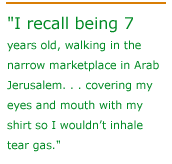The following first appeared in Wiretap.
Worrying about Family in Palestine
Unlike my mother, who has been glued to the television watching news updates, I refuse to sit and soak in all the killing and carnage going on in the world. I’m a full-blooded Palestinian Muslim born in America, and in my house our biggest concern right now is what’s going on in the Middle East.
As news from the West Bank slowly trickles in to the States and I get glimpses of the situation there, I dread the call that will inform us that one of the nine family members remaining has been blown up, beaten, or shot to death. We had a close call recently when my uncle Ziad had his fingers blown off by a motion detecting mine that was left in a plastic bag on the side of the road.
I think that during the September attacks many of us in America got a glimpse of what the occupied territories of Palestine are like every day. Except, what happened in New York is over and our country is slowly getting back on its feet. What’s happening in Palestine is continuous and has been going on for 52 years.
My 14-year-old cousin Donya just finished one of the most difficult school years she has faced in her seven years living in the West Bank, and her troubles had little to do with the school curriculum. In a recent phone conversation Donya told me about a grueling hour and a half commute to school that would take 10 minutes, if it weren’t for the checkpoints in between. In the morning she leaves the village hours before her first class and walks nearly a mile to reach one of many taxis it takes to get there.
On June 8, several days into her remaining week of school, during finals week, Donya said she climbed a mountain to avoid a checkpoint from fear of being killed. “That day they wouldn’t let anyone pass,” she said. “They start shooting at anybody if they passed.”
She wasn’t so lucky on her trip home. Israeli soldiers opened fire on their taxis after refusing passage for her and many other students trying to find an alternative way home to their neighboring villages. She spent the night in Ramallah with a relative before returning home safely on the same road the next day. “And they call us terrorists,” she said. “That day I felt that they were the terrorists.”
Four Years in Palestine
In 1995 after my freshman year of high school, I left to visit Palestine as a change of pace. Although I had visited during the summers of 1983, 1987 and 1992, for three months each time, the last trip turned into a four-year stay.
It was only living there that I found the truth, and of what it was really like to travel from point A to point B. It felt like I was holding my life in a loose pocket where it could easily be lost.
I recall being 7 years old, walking in the narrow marketplace in Arab Jerusalem that surrounded Al-Aqsa mosque covering my eyes and mouth with my shirt so I wouldn’t inhale tear gas.
With the prominent displays of American flags in the wake of September11th, I have often been reminded of how, during a 1987 visit, Israeli soldiers entered our village and took down all the Palestinian flags on display. Later that summer, as I was buying a falafel sandwich in the Ramallah marketplace, I saw a child being dragged by his collared shirt and put into the back of an Israeli jeep.
In 1992 I remember walking in the same marketplace and seeing snipers looking down at us from our own buildings.
. . . People continue to call Palestinians terrorists and the media focuses on the, “suicide bombings” that continue to taint the reputation of those Palestinians who support a nonviolent solution, but they fail to cover little Arab villages like mine which are flanked by Israeli settlements and denied basic necessities.
In January an Israeli tank burst the main water pipe in my village and the residents spent seven days without running water. While hoping that the occupation and oppression ends and Palestine is finally recognized an independent state, my family remains confined to their homes as the cycle of violence continues. >>Back to the introduction to Roots
by Lailie Ibrahim 
 I recall being stopped at checkpoints and treated with hostility as Israeli soldiers in military fatigues checked for “anything suspicious.”
I recall being stopped at checkpoints and treated with hostility as Israeli soldiers in military fatigues checked for “anything suspicious.”